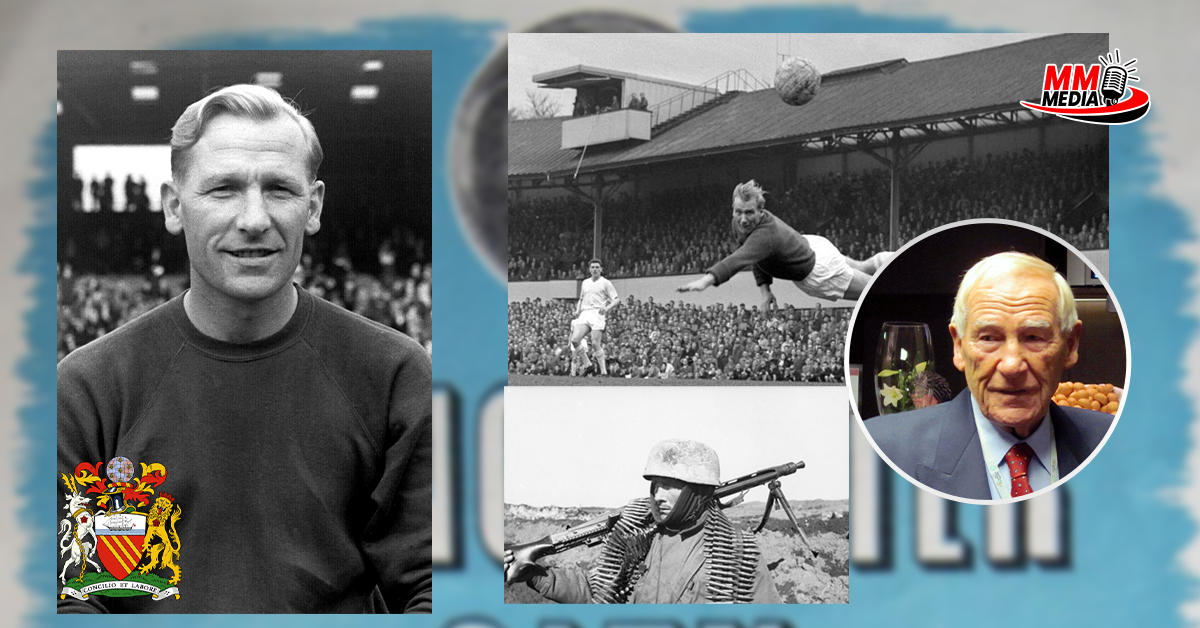Bertrand Trautmann, a legendary goalkeeper for Manchester City who was a Nazi soldier in World War II

Today we will present the story of Bertrand Trautmann, who went from being a Nazi soldier to becoming a legendary goalkeeper for Manchester City. Bertrand Trautmann was born on October 22, 1923 in Walle, west of Bremen. In 1930, due to the economic difficulties and political changes in Germany under Nazi rule, the Trautmann family suffered financial difficulties and sold their house and moved to an apartment in Gropelingen, a working-class area of Bremen. Trautmann was interested in football and athletics from an early age, and volunteered at the YMCA and the Blau und Weiss football club.
In August 1933, Trottmann joined the Jungvolk, the junior wing of the Hitler Youth, and the following year he won several local junior athletics competitions and was awarded the Sports Medal by German President Paul von Hindenburg. At the outbreak of World War II, Trottmann was working as an apprentice mechanic. In 1941, Trottmann joined the Luftwaffe, the Wehrmacht's air force, as a radio operator. During his training, Trottmann showed little aptitude for radio work and was transferred to Spandau to become a parachutist due to his lack of qualifications. Trottmann also received several medals in the military, but by 1945, he was in the British Army, where he was captured as a prisoner of war. Trottmann was interrogated near Ostend, Belgium, and then transferred to a transit camp in Essex, England. Trottmann was later found to be a Nazi and was transferred to a prison camp at Marbury Hall, near Northwich, Cheshire. After a while, Trottmann was not considered a Nazi but an ordinary German soldier, and his sentence was reduced to a light sentence, and he was sent to Fort Crosby in Hightown, near Liverpool, where he was made to work on local farms. Trottmann remained there for three years, before being transferred to Pow 50 High School in Ashton-in-Makerfield in 1948.
There Trottmann played many games as a centre-back, but after an injury in a match against Haydock Park, he was transferred to goalkeeper, and from that time on, Trottmann became a goalkeeper. The POW camp was closed and Trautmann was offered a job back in Germany, but Trautmann refused and instead worked on a farm in Milnthorpe, England, and as a bomb disposal officer in Huytho. In 1948, Trautmann began playing as an amateur goalkeeper for Liverpool County Combination club St Helens Town. During the 1948–49 season, Trautmann showed his skills and a record attendance of 9,000 spectators attended the Mahon Cup final, a local cup competition. Since Trautmann's arrival, St Helens Town have improved significantly and in the 1949–50 season they have been promoted to Division Two of the Lancashire Combined League.
While at St Helens Town, many clubs were impressed by Truman's skills and were keen to sign him before the start of the following season. The first club to make an offer for Truman was Manchester City, a major club in the First Division. Truman signed a professional contract with City on 7 October 1949, making him the first German athlete to wear Adidas's shirt in Britain. Initially, Manchester City fans and the media were unhappy with the signing of a former German soldier, leading to a series of protests. Many British fans in Manchester were particularly angry, with around 20,000 people protesting his signing. Truman's first major signing came in January 1950, when he played against Fulham in a friendly match. Trotman was a great defender and was praised by both the fans and the public. Trotman gradually gained recognition for his goalkeeping skills and Trotman earned a place as the first choice goalkeeper for Manchester City. Trotman played a key role in Manchester City's success, leading the team to the FA Cup Final in 1955. The final was against Newcastle United, who had won the trophy in 1951 and 1952. Trotman was a key player in the Newcastle United defence, winning the match 3–1 and lifting the FA Cup.
Trotman also won the Player of the Year award. Manchester City finished fourth in the league in 1955–56 and reached the FA Cup Final for the first time. This time, it was against Birmingham, with City leading 3-1. With just minutes to go, Trotman was seriously injured when he was hit in the neck by an opposing player. However, Trotman refused to be substituted and made the most of Birmingham's attack, becoming one of the best players in the game. In the end, City won the FA Cup again. Trotman suffered five broken vertebrae in the game, with a second broken in two. Trotman struggled to recover from his injury and returned to the game in 1956–57, but his confidence was hampered by injury. Trotman retired from football on 15 April 1964 in front of 47,000 fans.
Trotman played for Manchester City for 15 years, from 1949 to 1964. Bert Trautmann overcame many obstacles to become a legendary Manchester City goalkeeper, going from a Nazi soldier to a professional goalkeeper. I will end this article by saying that Trautmann's relentless determination, hard work and love for football have made him a better goalkeeper day by day. Thank you to everyone who has read this far.
#MMMedia
#BertTrautmann
#mancity
#goalkeepers
#nazisoldier
最新消息





